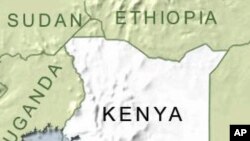The United States says it plans to help protect those set to testify before the International Criminal Court against top Kenyan officials implicated in the country's 2008 political violence. The Court's chief prosecutor has expressed concern that key witnesses are coming under harassment.
The U.S. Ambassador-at-Large for War Crimes Issues, Stephen Rapp, told reporters in Nairobi that the United States would offer assistance in shielding witnesses from harm if a panel of judges authorizes ICC chief prosecutor Luis Moreno Ocampo to precede with pre-trial investigations.
The ruling from the international court could come in the next few weeks.
Ambassador Rapp issued grim words of warning about Kenya's future if those most responsible for the organized killings were not brought to justice.
"If there is not accountability for the violence of 2007, 2008, when the election cycle returns in 2012 it could happen again, and it could be worse," Rapp said. "The blood of Kenyans would be spilled, the hopes for the future would be dashed, and it would affect the entire region."
The diplomat would not give any specifics about what type of assistance the United States planned to offer, but suggested that re-location of the witnesses was a possibility.
Kenya has already passed into law the Witness Protection Act, but local human rights groups say that at least 22 Kenyans who had previously testified behind closed-door inquiries have reported harassment. A number have been forced into hiding, fearing for their lives. Some say the police themselves were complicit in the intimidation.
The identities of the testifiers were evidently leaked despite a pledge of confidentiality within earlier probes, an indication of the powerful interests behind the push to keep the witnesses quiet. Kenya's public institutions have consistently been ranked as the most corrupt in the region.
Bowing to pressure, the Kenyan cabinet recently announced that it would seek to strengthen its witness protection program by creating an independent agency with its own source of funding. But the bill would first have to be passed by parliament, which is
currently on recess.
Ambassador Rapp also announced that Kenya could face U.N. sanctions before the end of the year if its leaders do not come clean on the alleged presence within its borders of a chief Rwandan genocide suspect.
He said that the top prosecutor at the International Criminal Tribunal on Rwanda plans in June to seek sanctions against Kenya from the United Nations Security Council if the nation continues to serve as an obstacle to capturing fugitive Felicien Kabuga.
Kabuga owned a Rwandan radio station which for days rallied ethnic Hutu to kill their ethnic Tutsi countrymen. Over 800,000 were killed in just 100 days of mass slaughter.
"I'm here to convey the message that the level of cooperation has to dramatically improve," Rapp said. "There is no question that Felicien Kabuga has been in Kenya."
According to the U.S. envoy, ICC prosecutor Ocampo could seek the indictment of up to six Kenyan individuals at The Hague.
Kenya is a statutory member of the ICC and would be obligated under international law to arrest any citizen indicted by the Court.




